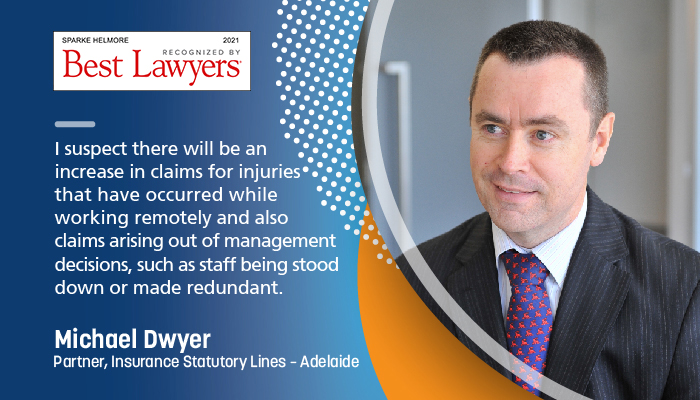Michael Dwyer, a 2021 Best Lawyers "Lawyer Of The Year Award" winner
25 May 2020
Michael Dwyer fell into practising defendant workers’ compensation and it’s been his passion for 23 years. His expertise and commitment to this area of law was recently celebrated by Best Lawyers when it announced him as the 2021 “Lawyer Of The Year Award - Personal Injury Litigation, Adelaide”.
Michael was sceptical about whether lawyers could be effective while working remotely, but the events of this past few weeks has turned him into a convert, and even says that they can even work better than before albeit differently. We have a chat about the issues that he sees affecting workers’ compensation in South Australia, how the toughest problems and decisions he handles involve people and what he thinks about the theory that Pope John Paul I was murdered by the mafia.
What drew you to practise your area of insurance law?
My first job as a graduate lawyer 23 years ago was with a small boutique law firm in Pitt St, Sydney, and this firm specialised in workers’ compensation defence work exclusively for self-insurers and specialist insurers. I had no idea what was involved at the time I applied for the job. I was just happy to obtain employment, having spent so long studying to obtain my law degree.
A year later I was offered a role at Sparkes doing exactly the same work and soon realised I would need to commit to an area of specialisation in order to progress in my career. I’ve been in the defendant workers’ compensation club ever since!
How has the current issue with COVID-19 affected your area of law and the clients you work with?
We are currently at the height of COVID-19 restrictions, so every aspect of work is different to what we’re used to. There is no face-to-face interaction with clients or the courts. Everything is by way of tele-conference or in some cases, video-conference. When working remotely was first suggested to be the norm for some time to come, I had some concerns as to how we could continue doing what we do to the same standard, but now after working this way a month, I’m satisfied that our technology platforms not only allow us to maintain that level of service, we actually do it better, albeit differently.
As for how COVID-19 is affecting workers’ compensation law, I think it is a little too early to tell. I suspect there will be an increase in claims for injuries that have occurred while working remotely and also claims arising out of management decisions, such as staff being stood down or made redundant. The Courts and Tribunals are continuing to deal with caseloads while implementing social distancing measures. The novel requests for COVID-19 related advice from clients are around the impact of the restrictions and economic downturn on return to work obligations and how JobKeeper payments might impact on weekly payment entitlements and premiums. There are also queries around the difficulties associated with obtaining medical examinations and treatment in the current climate and again, how this impacts a particular workers’ compensation liability.
What do you see are the major issues or trends in compensation law for the coming year?
Each jurisdiction has its own particular issues or trends, however in SA where I mostly practice, the main area of uncertainty is still with respect to the assessment of Whole Person Impairment (WPI) for claims assessed under the Return to Work Act 2014. In particular, when different injuries are combined, or not combined, remains an area where the law needs to be settled sooner rather than later, given there is so much riding on the outcome of a WPI assessment, including whether a worker is classified as a seriously injured worker.
What are the toughest problems and decisions you handle?
The toughest problems and decisions I handle without a doubt all involve dealing with people. The law and the legislation can at times prove to be tricky to navigate, but when you add a difficult person into the mix, that is where the time and effort is taken up and experience becomes more important than ever.
What are the types of professional and personal skills that you think people need to succeed at this type of work?
The most important professional skill is to be able to think strategically. You need to know where you want to go and have a plan on how to get there. This enables you to provide the excellent service that assists the client to achieve their goals. As far as personal skills are concerned, you need to be able to communicate effectively, no matter who you are dealing with, and also be able to listen.
What have you read lately that you really enjoyed?
I recently read “In God’s Name” by David Yallop. He was convinced Pope John Paul I was murdered by the mafia and corrupt individuals in the Vatican. I couldn’t put it down. It certainly made me stop and think and I couldn’t believe what I was reading at first. The fact that New York mobster Anthony Raimondi has recently come out and claimed a role in the Pope’s murder, which occurred 41 years ago, has added to the intrigue.



